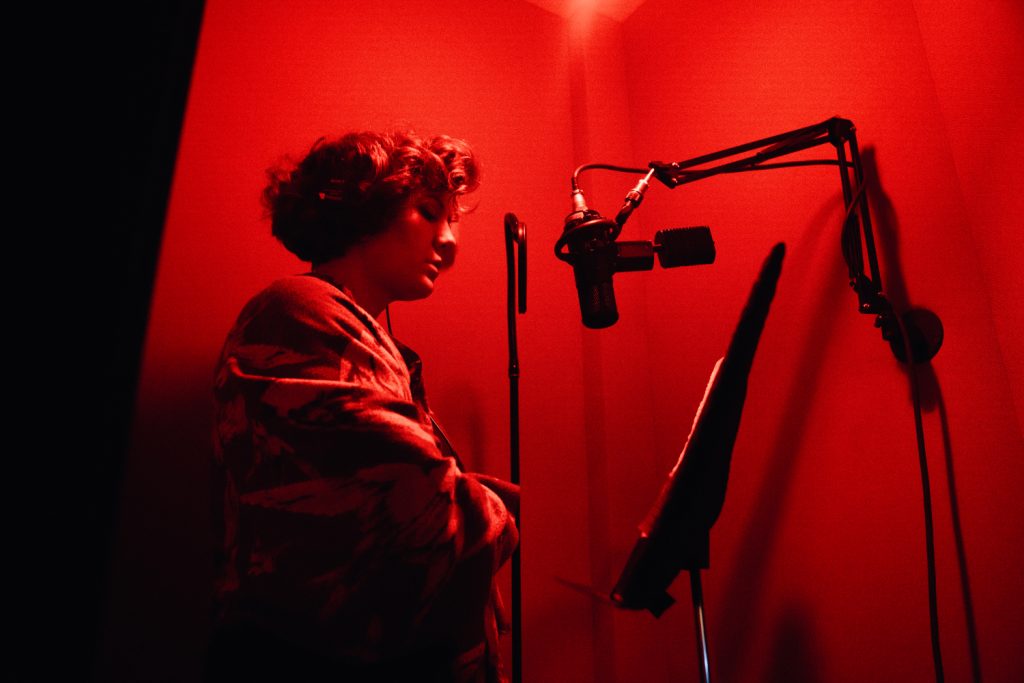
From the heart of Chicago’s South Side, where she grew up with a Greek immigrant dad and an American mom, LIZA is carving out her own lane in soulful folk jazz with a voice that’s equal parts sweet and soul-stirring, weaving gentle guitar riffs with lush, cinematic strings. Since inking a deal with New York’s indie Hood Rock Records, she’s been in the studio with heavyweights like Ski Beatz, LaKecia Benjamin, Nitty Scott MC, and Hypnotic Brass Ensemble, building hype for her debut album—due in 2026 and helmed by guitarist YOUNG JIMMY—that’s set to deliver her magic.
Her new single, ‘Gone September’, a five-minute love-drenched ballad packed with mystery, was born from a late-night adventure after singing at Cast Party at the iconic Birdland jazz club, proving she’s ready to shake up the scene.
Get the full scoop on LIZA’s vibe and story in our exclusive interview, below.
Growing up with Greek folk from your dad, jazz from your mom, and everything from Ike and Tina to Sinatra blasting at home—what’s one family jam session memory that still fires up your creativity today?
My American grandma used to play Jimmy Scott’s “When Did You Leave Heaven” on her floor-standing speakers and dance with my grandpa around the kitchen. That image has never left me—it’s love, rhythm, and time all moving together. On the other side of my world, I’d watch my father dancing the zeibekiko with my uncles at Greek picnics, that proud, grounded, soulful movement that speaks without words. And then there was my mother, singing live in the jazz scene—her voice filling smoky rooms with feeling.Being from two cultures, there was always music—but each lived in its own space. My father’s folk songs and my mother’s jazz standards didn’t often meet, but I like to think they harmonize through me now. If he’d lived longer, I would’ve found a way to get them to sing together. That’s the energy I carry forward every time I create—bridging what once felt separate into one sound.
How did signing with Hood Rock Records shape the way you approached your debut single ‘Gone September’?
Signing with Hood Rock Records really changed the way I approached ‘Gone September’. Before that, I was used to recording my vocals on my own or at a producer’s home, mostly for free. My comfort zone has always been live performance — feeding off the crowd and the energy in the room. Recording, though, is a different kind of art. For ‘Gone September’, I wanted to bring the same raw emotion I feel on stage into the studio — to hit the moments that felt missing in my earlier recordings. Young Jimmy and I really locked in; we rehearsed and refined every detail leading up to the session. His experience and versatility pushed me to deliver the emotion the song deserved. When we finally stepped into the booth, we captured it in just two takes — the pauses, the emotion, the feel — everything clicked. I’m always tempted to tweak something after the fact, but this record truly caught the spark. It’s honest, it’s emotional, and it represents a new level of growth for me as an artist.
Walk us through how the wild night after Cast Party at Birdland—daisy in hand, stranger’s invite—turned into the hazy romance of ‘Gone September’?
Ha, you see me! It all started in the aftershock of that night at Birdland—music still in my bones, yes, a daisy in hand, and this stranger who appeared like a spark from nowhere. Like I somehow knew I was walking towards a person I had yet to know. He had that kind of magnetic energy that feels written somewhere in your fate. Before I knew it, he was calling up to my window from the street, like something out of an old movie. He inspired me. Funny enough, I used to despise Coney Island. That night taught me that if I just let go—really surrender—the beauty waiting on the other side of fear can change everything. I remember walking through Union Square, in my head about life, contemplating moving back to Chicago.
Then, as if the gods intervened, he appeared and said, “Stop thinking. Come with me.” And that’s when Pandora’s box opened. We ended up at the Coney Island boardwalk while it was still dark around 4 a.m.—it should’ve been a wasteland, but it wasn’t. There was this vibration in the air, the rides in Astroland still, until morning, like the world paused. It felt like the universe was saying, “You two need some magic—pay attention.” We stayed until dawn, sandpipers chasing the tide, the sky turning pink. I’d lived in New York a couple of years by then, but that was the first night I truly felt alive in it—not just surviving, but living. Nothing lasts forever, but I carry the imprint. That kind of fleeting connection, that chance meeting—it’s the kind all good art is born from.
With ‘Gone September’ clocking in at five minutes of pure atmosphere, how did you nail that balance of mystery and memory without rushing the story?
Anything worth something takes time and lasts long, so I took my time. I cut the fat, trimmed the unnecessary. I woodshedded the song at the Nuyorican, Bowery, and Caffe Vivaldi — sculpting what mattered until I knew that when I opened my mouth, what I had to share was honest, and felt right. I wasn’t trying to “be”anything; I was just sharing my heart. I was true to a defining moment I desperately needed to express. It felt like capturing the concentric circles of a memory — something that keeps rippling outward. And even now, it’s still mysterious to me.
As a Greek-American artist, how do you weave your cultural roots into your music and storytelling?
My father was old-school—off-the-boat Greek—and he was that guy. I grew up in our family’s restaurant in Chicago’s Greektown, Diana’s Opaa, surrounded by music, laughter, and stories that felt larger than life. Frequent guests included author Harry Mark Petrakis, and my father and uncles were friends with Anthony Quinn. The room was always filled with characters—real people with fire in their bellies. My dad was a strong man with heart. He didn’t care where he sang, danced, or expressed himself—he was pure passion, whether he was behind the stove or breaking into song. He never lost that spirit when he came to America, and that’s what shaped me. He cooked with the same zest he sang with. He was so present, so alive, that I grew up wired the same way—to share freely, to never hold back where I sing or how I create. Greeks have this deep sense of togetherness. Everything revolves around music, food, and community—it’s expressive, dramatic, full of humor and truth. That ability to dance or sing out of nowhere, even when the world might look down on it, taught me how to carry joy unapologetically. It’s infectious. It transcends language. That spirit—the passion, the raw honesty, the ability to feel and express viscerally—shows up in every note I sing and every story I tell. It’s what makes me uniquely Greek-American.
That whirlwind romance in ‘Gone September’ feels so vivid—how did you tap into that emotional depth without oversharing?
I’m an emotional human — but I’m only serious when it comes to truth. I was moved. My soul shook. I couldn’t get this person out of my system, so I wrote it out and left it on paper, as best I could. All the extra details — like Coney Island I mentioned later — they’re all in there, but buried in the subconscious. Writing it was a selfless act, a fine line, a tango with taste. There’s even more behind that song, but it’s no longer mine alone — it’s yours now, it’s ours. Sometimes less is more. The impact of a captured experience is what helps us connect, because emotions are fleeting. I’m just a word painter, trying to frame the moments that matter to me. I’ve always said lyrics are prayer — when I sing that moment, I know exactly what inspired the words. And as much as I’ve shared, there’s still more — but that part is mine, it’s for me to experience in the delivery.
Touring with LaKecia Benjamin and trading verses with Ski Beatz and Hypnotic Brass Ensemble—which collab pushed you furthest out of your comfort zone, and why?
Lakecia Benjamin.
There’s something profoundly humbling and powerful about traveling the world—this case Europe—sharing music that’s bigger than yourself. It wasn’t my personal project, but I was part of something sacred. That year, Europe was shaken by bombings, and I’ll never forget arriving in Brussels the same week the train station was attacked. We performed down the street from that very spot at L’Archiduc—for a community still trembling from what had happened. Yet the music… it healed. You could feel the audience breathe again through sound.In those moments, I truly understood the spiritual weight of music. Singing beside LaKecia and her band grounded me in my purpose as a vocalist. She introduced me to the work and essence of Alice Coltrane—and that changed everything. LaKecia’s approach to music is about feeling, not just precision. She pushed me to stretch out vocally, to trust the tone even when it cracked, to let it live. That experience forever changed how I create and how I serve the music.
If actors have method acting that allows them to reach new heights in their craft with the caveat that it can take extreme mental tolls on them, do you think musicians have a similar method when it comes to their craft and if so, could you shed some light on it if you have a personal experience?
“Stanislavski says, draw the magic circle around you so you may allow yourself to be private in public.” I learned that from Jacqueline Brookes in my first acting class at Circle in the Square. She and Therese Hayden taught the method, and yes — there’s a real caveat to letting go and visiting sense memory. They used to remind us, after your work, take extra care crossing the street or getting home. Sense memory is a hell of a drug! It’s powerful — almost like magic — when you connect to those experiences. But I’ve learned to write the lyrics, sing the song, and leave it there: on the stage, in the recording, or at rehearsal. Just like a doctor doesn’t operate at home, you have to leave it where it belongs and save it for the right time and place. For me, living creatively doesn’t mean suffering for the art. It means staying open, present, and ready to catch lyrics — like catching a butterfly or waking from a dream. The mental toll isn’t necessary, though some artists find it romantic to flirt with that edge. I don’t.
If you could beam back to that Coney Island sunrise and whisper one piece of advice to your past self mid-whirlwind, what would it be to keep the spark alive?
I would just observe if I were omnipresent! I wouldn’t change a damn thing. It lives in my spirit. And that’s that!
Stream ‘Gone September’:
Follow Liza:
Instagram – Spotify – Facebook
Follow Hood Rock Records:
Website

